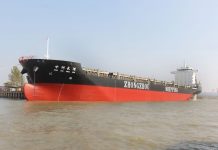
Braemar shipbrokers said it is expecting new orders for vessels as the ageing panamax fleet increases and carriers respond to new carbon regulations and look to reduce their exposure to an increasingly volatile charter market.
According to Braemar researcher Jonathan Roach, some 25% of the panamax fleet is currently over 20 years old, and that figure is set to increase to 40% by 2027.
“As container shipping progresses with decarbonisation, liner companies may want to own a larger share of their fleets, to control carbon taxes following increased CO2 regulations,” explained Roach.
That view is supported by the composition of the current orderbook, which historically has hovered around 55% carrier-owned tonnage, but now carrier-owned newbuildings are at 80% of the orderbook.
Roach argues, “This swing displays that liner companies have focused investment on newbuildings over the past few years, reducing exposure to the charter market.”
Analyst Jon Monroe believes that the swing from chartered to owned tonnage could be crucial in the coming years, altering the structure of the supply side of the market, with carriers returning chartered tonnage and wresting greater control on costs and ultimately rates.
“As carriers strategically pivot to increase the proportion of owned vessels relative to chartered ones, the anticipated capacity surge in ocean shipping lines may be more subdued than expected. This shift in strategy could potentially lead to an increase in rates rather than a decrease,” said Monroe.
Returning tonnage “can certainly play a role in controlling costs,” agreed Darron Wadey, at the Dutch consultancy Dynamar.
That said, however, “it would be part of a wider package of cost cutting measures, this being a reaction to the prevailing market conditions,” said Wadey.
Dynamar believes it would be very difficult to sustain freight rates by simply returning chartered tonnage, he pointed to the clear implication that “returning vessels is a sign that the market fundamentals are weak, ultimately, the truism of market economics will always win out: when capacity grows faster than demand, rates must fall.”
That sentiment was brought into sharp relief with Hapag-Lloyd’s 2023 preliminary results, which saw a US$300 million loss in Q4 EBIT, with year-on-year EBIT falling US$25.7 billion to US$2.7 billion on similar volumes, as average freight rates plummeted 48%.
Moreover, Wadey points out that it is not a given that chartered vessels will be more expensive to operate than owned vessels.
Vessels in the current orderbook were ordered at elevated prices, said Wadey, “it’s market economics again as, over this period, demand was outstripping supply – and will therefore have similarly elevated finance costs.”
Charterers are also subject to the same market economics as owners and will reduce their charter rates accordingly to secure employment for their vessels, he added.
“Whilst we are a long way from such a situation, the ultimate expression of this came in the darkest periods of the post-2008 financial/economic crises when chartered-in ships were cheaper to run than owned ones, in some instances.”
Wadey concludes, that in the post-financial crisis market, “There was the incongruous situation of carriers laying up owned tonnage in favour of operating chartered units.”
Mary Ann Evans
Correspondent at Large








